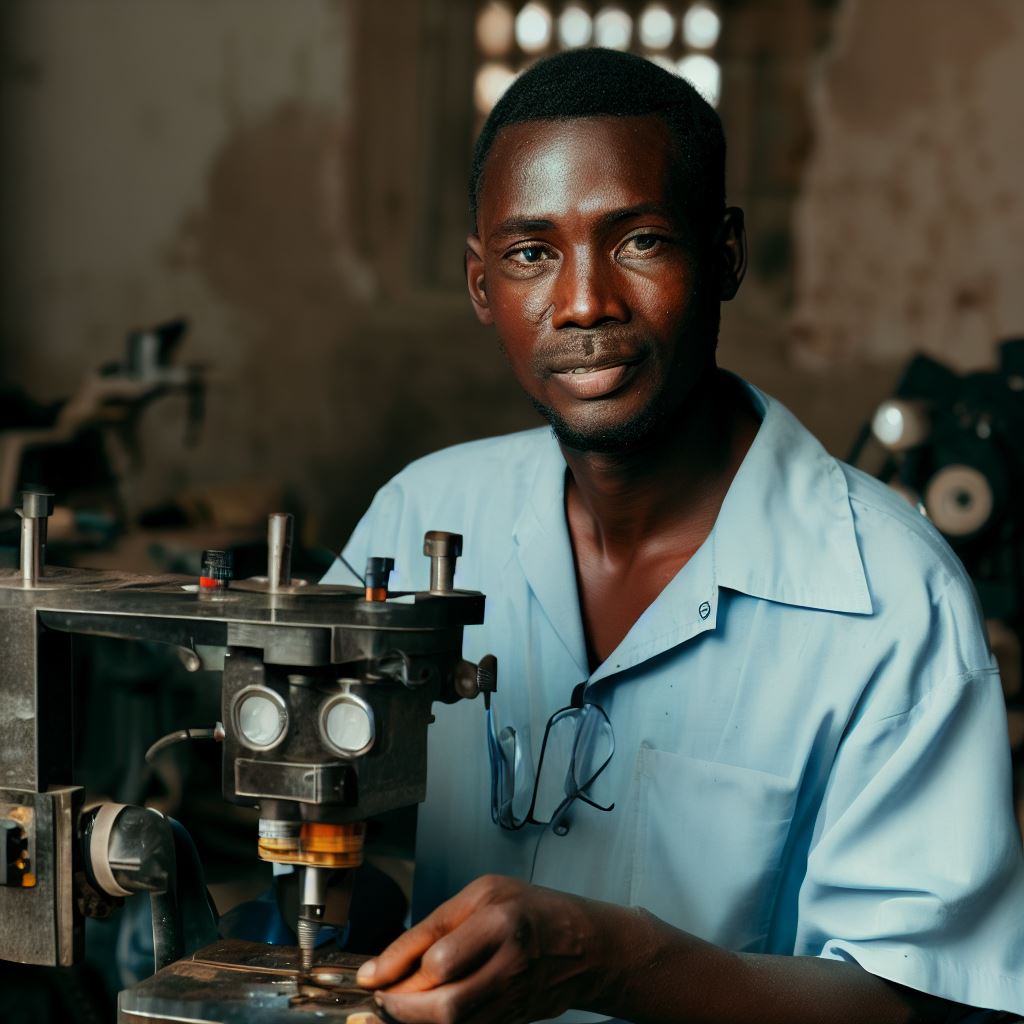Introduction
Let’s talk about optical fabrication technicians responsibilities.
Optical fabrication technicians play a crucial role in the field of optics and manufacturing.
Optical fabrication refers to the process of creating optical components with high precision.
In the optics and manufacturing sector, optical fabrication technicians hold a crucial role.
They are responsible for creating precise optical components that are used in a variety of applications, including lasers, cameras, and telescopes.
The process of optical fabrication involves shaping and polishing glass or other materials to create lenses, mirrors, prisms, and other optical components.
These components must meet strict tolerances and specifications to ensure optimal performance.
Optical fabrication technicians use specialized equipment and techniques to achieve the desired results.
They work with precision tools, such as lathes, milling machines, and diamond tools, to shape and polish the optical components to the required specifications.
In addition to shaping and polishing, optical fabrication technicians also perform quality control checks to ensure that the components meet the required standards.
They use metrology tools, such as interferometers and spectrometers, to measure the optical components and verify their performance.
Optical fabrication technicians often work closely with engineers and designers to understand the specific requirements of the optical components.
They may also collaborate with other technicians to troubleshoot any issues that may arise during the fabrication process.
Overall, optical fabrication technicians play a vital role in the development and production of optical components.
Their expertise and attention to detail ensure that these components meet the highest standards of quality and performance.
Without their contributions, many optical devices and technologies would not be possible.
Duties of an Optical Fabrication Technician
Preparation of materials
- Selecting appropriate materials
- Cutting and shaping materials
Operating machinery
- Familiarity with different fabrication equipment
- Setting up and calibrating machines
- Running production and testing processes
Testing and inspection
As an optical fabrication technician, your role in manufacturing optical components and systems is pivotal.
Your tasks encompass:
- Material selection based on optical properties.
- Cutting and shaping materials as per specifications.
- Operating various fabrication equipment like grinding and polishing machines and CNC machines.
- Accurate machine setup and calibration.
- Overseeing production, making real-time adjustments.
- Conducting quality control tests with measurement tools such as interferometers and spectrometers.
- Identifying and documenting defects, ensuring adherence to standards.
- Meticulous inspection for flaws, including scratches, bubbles, and dimensional accuracy.
Your mission is to uphold quality standards and specifications, aiding advancements in telecommunications, healthcare, and scientific research.
Read: Technology and Tools: Modern Epidemiology in Nigeria Explored
Responsibilities of an Optical Fabrication Technician
Adhering to safety protocols
Safety is paramount in any manufacturing environment, and optical fabrication is no exception.
As an optical fabrication technician, one of the foremost duties is to adhere to safety protocols diligently.
This includes wearing appropriate protective gear to safeguard against potential hazards such as chemicals, particles, or radiation.
By putting on safety glasses, gloves, and other necessary equipment, technicians guarantee their personal safety throughout the fabrication process.
Additionally, following safety guidelines is crucial during fabrication processes.
These guidelines outline necessary precautions and procedures to minimize the risk of accidents or injuries.
By strictly adhering to these guidelines, technicians create a safe working environment for themselves and their colleagues, reducing the likelihood of costly disruptions and ensuring smooth production operations.
Documentation and record-keeping
Accurate documentation is essential to monitor the progress of optical fabrication and maintain consistent quality control.
Optical fabrication technicians are responsible for maintaining detailed production records.
These records help track the various stages of fabrication, ensuring that each step is completed accurately and efficiently.
By consistently updating production records, technicians enable effective analysis and troubleshooting, facilitating continuous improvement in the fabrication processes.
In addition to production records, capturing test results and inspection findings is equally vital.
Optical components undergo rigorous testing and inspection to ensure they meet strict quality standards.
Technicians meticulously record these results and findings to identify any issues or deviations from specifications.
This meticulous record-keeping allows for comprehensive documentation of the fabrication process, ensuring accountability and traceability.
Collaboration and communication
Optical fabrication is often a collaborative endeavor, requiring effective teamwork and communication.
Optical fabrication technicians are expected to work harmoniously with other technicians, engineers, and supervisors to accomplish shared goals.
Collaborating with colleagues enhances productivity and efficiency, leading to the timely completion of projects and the overall success of the manufacturing process.
Communication is vital for an optical fabrication technician to effectively report progress and any issues encountered during fabrication.
Regular updates to supervisors provide them with valuable insights into the status of ongoing projects.
By promptly reporting any challenges or concerns, technicians contribute to resolving potential problems swiftly and maintaining a smooth workflow.
Effective communication ensures that all stakeholders are well-informed and can make informed decisions based on accurate information.
In review, the responsibilities of an optical fabrication technician span various aspects crucial to the success of the fabrication process.
Adhering to safety protocols, maintaining accurate documentation, and fostering collaboration and communication contribute to the efficient and quality-driven completion of optical fabrication projects.
With their attention to detail and commitment to excellence, optical fabrication technicians serve as essential contributors in the precision optical manufacturing industry.
Read: Epidemiology in Nigeria: Insights from Local and International Experts

Skills and Qualifications Required
Technical knowledge and expertise
1. Understanding of optical principles and concepts
Optical fabrication technicians must possess a deep understanding of optical principles such as refraction, reflection, and diffraction.
This knowledge helps them comprehend the behavior of light and its interaction with various materials.
2. Proficiency in using fabrication equipment and tools
Operating fabrication equipment and tools is a fundamental part of the job.
Technicians need to be skilled in using specialized machinery, such as precision saws, lathes, polishers, and coating machines.
They must also be knowledgeable about the correct techniques for lens grinding, polishing, and finishing.
Attention to detail
1. Ability to identify minor defects and imperfections
Optical components need to meet strict quality standards.
Technicians should have a keen eye for detail and be able to detect even the smallest surface defects, scratches, or impurities that can affect the performance of the optical device.
2. Precision in measurements and calculations
Accurate measurements and calculations are vital in optical fabrication.
Technicians must be meticulous when measuring dimensions, angles, and curvatures of optical components.
Any errors can lead to subpar optical performance or even complete failure.
Problem-solving skills
1. Troubleshooting issues during fabrication processes
Optical fabrication involves complex procedures, and problems can arise at any stage.
Technicians must possess strong problem-solving skills to identify the source of issues, whether it’s equipment malfunction, material inconsistencies, or process errors.
They need to rectify problems promptly to ensure smooth production.
2. Implementing solutions to improve production efficiency
Continuous improvement is essential in optical fabrication.
Technicians should actively seek ways to enhance production efficiency, reduce waste, and optimize processes.
They need to propose and implement innovative ideas to streamline workflows, enhance productivity, and meet customer demands effectively.
In general, optical fabrication technicians need technical knowledge, attention to detail, and problem-solving skills to excel in their role.
Their expertise in optical principles and equipment operation, coupled with a keen eye for defects and the ability to troubleshoot and improve processes, ensures the production of high-quality optical components.
Read: Exploring Food Science Careers in Nigeria: A Beginner’s Guide
Career Opportunities and Growth
Potential industries for employment
Optical manufacturing companies are the primary employers of Optical Fabrication Technicians.
These companies specialize in producing optical components and systems used in various applications ranging from consumer electronics to medical devices.
Optical Fabrication Technicians play a vital role in these companies, ensuring the accurate production of high-quality optical components.
Another potential industry for employment is research and development facilities.
These facilities are often associated with academic institutions, government agencies, or private corporations.
Optical Fabrication Technicians are needed to support research efforts by manufacturing prototypes and experimental optical components.
Working in a research and development setting offers opportunities to be part of cutting-edge projects and contribute to advancements in the field.
Advancement opportunities
1. Supervisory roles
As Optical Fabrication Technicians gain experience and expertise, they may have the opportunity to advance into supervisory roles.
In these positions, technicians not only perform fabrication tasks but also oversee a team of technicians, manage production schedules, and ensure quality control.
Moving into supervisory roles allows individuals to take on more responsibilities and contribute to the overall success of the fabrication process.
2. Specialization in specific fabrication techniques
Another avenue for advancement is specializing in specific fabrication techniques.
Optical fabrication encompasses a wide range of processes, such as grinding, polishing, coating, and assembly.
By focusing on mastering specific techniques, technicians can become valuable experts in their respective areas.
This specialization can lead to higher levels of responsibility, increased job opportunities, and potentially higher salaries.
Overall, a career as an Optical Fabrication Technician offers opportunities for growth and advancement.
Whether working in optical manufacturing companies or research and development facilities, there are ample prospects to develop skills, take on leadership roles, and specialize in specific fabrication techniques.
It is a dynamic field that continuously evolves, making it an exciting choice for individuals passionate about optics and manufacturing.
Read: Salaries of Food Scientists in Nigeria: A Detailed Insight
Uncover the Details: Nigeria’s Biostatistician Job Market: An Analysis
Explore Further: Nigerian Statisticians’ Impact on Global Research
Conclusion
In summary, optical fabrication technicians are responsible for cutting, shaping, and polishing optical components.
They play a crucial role in industries such as optics, telecommunications, and manufacturing.
If you’re interested in pursuing a career in optical fabrication, take the necessary steps to acquire the relevant skills and education.




